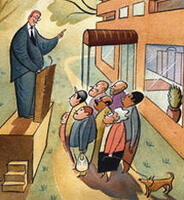HABITAT
Co-op Condo Buyers Imperius Co-op Condo Board
Aug. 26, 2011 — Is the co-op or condo board imperious where you live? Is that the impression you get from people in the building where you're thinking of buying an apartment? Is this something you really want to deal with as a buyer or a resident? Or can it be that the condo / co-op board is actually OK but just really, really bad at communicating with the staff and the owners — and if so, is there anything you can do about it?
There is. All you need is a peek behind the curtain at what a board's signals mean and the way people take them — which is doubly handy since you never know: You might become a board member yourself one day.
Take the case of 127 West 96th Street in Manhattan. The co-op board there had accomplished a great deal. The budget at the 128-unit co-op was balanced, a new roof had been installed, maintenance was reasonable and the building was in good physical shape.
And yet the annual shareholder meetings were, as one participant recalls, "tense" affairs at which residents seemed unhappy even though they had little about which to complain. One owner recalls she was actually "a little scared of the board," acknowledging that the directors appeared to be "shadowy figures" to her.
Those feelings and others all came to the surface when the board decided to redo the lobby and hallways in 2005.
One group of shareholders vociferously opposed the design choices and started a campaign that accused the board of ruling imperiously without concern for the residents' feelings. "There was this small faction that didn't like the lobby, and they were able to make it into this whole 'imperious board' thing," recalls Kate Chamberlain, the current board president. "There was a lot of animosity and finger-pointing," adds Rob Mecarini, who joined the board about three years ago.
Even if he didn't have an
answer, the fact the board
was listening was important.
But it wasn't just outside agitators. The board itself was split. So split, in fact, that four of the seven directors stepped down. "There were a lot of hurt feelings from the members of the design committee," says Chamberlain, adding that they felt the time and energy they had devoted to the redesign were unappreciated. A few months later, a fifth, longtime member stepped down for unrelated reasons.
So, enter the newbies. "You're looking at five new people on the board," Chamberlain notes. "By November of 2005 we only had two people who had any experience. We were trying to re-invent the wheel."
The newcomers had a lot more than the lobby to consider. They had to hit the ground running, not only re-inventing the wheel but changing the entire image of the board itself.
Spinning Straw into Gold
The new board devoted itself to communication and transparency. It decided the problems with the old board didn't stem from anyone's ineptitude or greed but from a general approach. It was a question of "spinning the information," says Chamberlain. "They didn't promote themselves to the shareholders," and that made them seem out of touch and, perhaps, arrogant.
The new board started with the idea of connecting with the owners, of dispersing the sense of hostility. The first step: a shareholder liaison, a board member who was good with people and could connect one-on-one with shareholders who had complaints.
"We realized that there were some people on the board who were more financially oriented but not necessarily good at handling communication, and I'm probably one of the more tactful board members," the liaison, Steve Brown, observes. "Initially, it was tough. I was the recipient of all the negative stuff. But I felt that if I could convince the shareholders that there was an outlet by which their voices would be heard that would change the feeling of what was going on in the building."
Having a shareholder liaison meant that someone who was both tactful and, unlike a property manager, lived there could interact immediately with residents. Because he was a co-op apartment owner, he had more of a stake in the building than a property manager and could relate to residents' concerns more readily.
In addition, he would visit them, giving them a chance to vent and also to feel someone was listening. Brown says that even if he didn't have an answer, the fact the board was listening was important. Supplementing that was the "Board Box" suggestion box, later abetted by an e-mail address.




